#fable novels
Explore tagged Tumblr posts
Text
Since the OP of this meme restricted this account… FINE I’m taking it for myself an posting it.
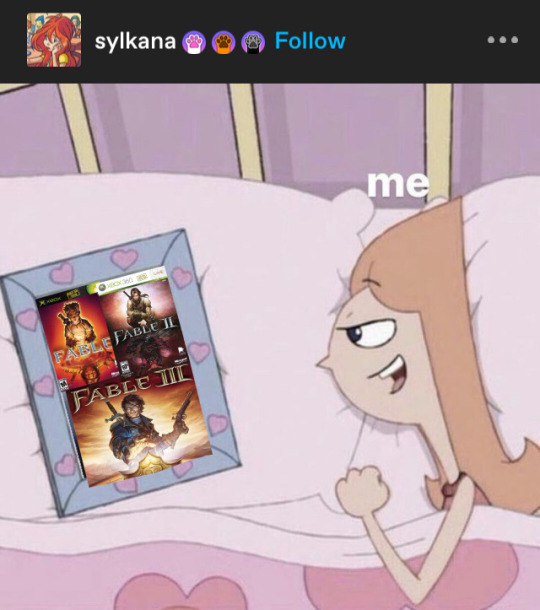
#fable games#fable game#fable3#fable2#fable Anniversary#fable 1#fable the journey#a heroes tale#fable novels#fable legends
9 notes
·
View notes
Text
Was reading a book review today that ended with, "This novel has quite enough love to do without mine." And honestly, it might be one of the prettiest ways of thinking about something that didn't quite meet your expectations but you're grateful for experiencing it.
#novels#literature#novella#pretty thoughts#books#reviews#fable#sentences that make you stare at the ceiling#reading#classical books#dark academia#chaotic academic aesthetic#aesthetic#studyblr#not for me#classics#dr jekyll and mr hyde
16 notes
·
View notes
Text
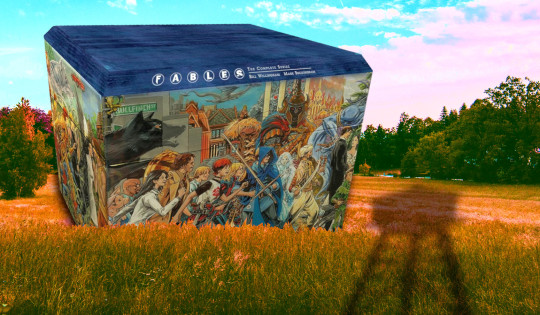
On September 22, I'm (virtually) presenting at the DIG Festival in Modena, Italy. On September 27, I'll be at Chevalier's Books in Los Angeles with Brian Merchant for a joint launch for my new book The Internet Con and his new book, Blood in the Machine.

It's been 21 years since Bill Willingham launched Fables, his 110-issue, wide-ranging, delightful and brilliantly crafted author-owned comic series that imagines that the folkloric figures of the world's fairytales are real people, who live in a secret society whose internal struggles and intersections with the mundane world are the source of endless drama.
Fables is a DC Comics title; DC is division of the massive entertainment conglomerate Warners, which is, in turn, part of the Warner/Discovery empire, a rapacious corporate behemoth whose screenwriters have been on strike for 137 days (and counting). DC is part of a comics duopoly; its rival, Marvel, is a division of the Disney/Fox juggernaut, whose writers are also on strike.
The DC that Willingham bargained with at the turn of the century isn't the DC that he bargains with now. Back then, DC was still subject to a modicum of discipline from competition; its corporate owner's shareholders had not yet acquired today's appetite for meteoric returns on investment of the sort that can only be achieved through wage-theft and price-gouging.
In the years since, DC – like so many other corporations – participated in an orgy of mergers as its sector devoured itself. The collapse of comics into a duopoly owned by studios from an oligopoly had profound implications for the entire sector, from comic shops to comic cons. Monopoly breeds monopoly, and the capture of the entire comics distribution system by a single company – Diamond – was attended by the capture of the entire digital comics market by a single company, Amazon, who enshittified its Comixology division, driving creators and publishers into Kindle Direct Publishing, a gig-work platform that replicates the company's notoriously exploitative labor practices for creative workers. Today, Comixology is a ghost-town, its former employees axed in a mass layoff earlier this year:
https://gizmodo.com/amazon-layoffs-comixology-1850007216
When giant corporations effect these mergers, they do so with a kind of procedural kabuki, insisting that they are dotting every i and crossing every t, creating a new legal entity whose fictional backstory is a perfect, airtight bubble, a canon with not a single continuity bug. This performance of seriousness is belied by the behind-the-scenes chaos that these corporate shifts entail – think of the way that the banks that bought and sold our mortgages in the run-up to the 2008 crisis eventually lost the deeds to our houses, and then just pretended they were legally entitled to collect money from us every month – and steal our houses if we refused to pay:
https://www.reuters.com/article/idINIndia-58325420110720
Or think of the debt collection industry, which maintains a pretense of careful record-keeping as the basis for hounding and threatening people, but which is, in reality, a barely coherent trade in spreadsheets whose claims to our money are matters of faith:
https://pluralistic.net/2023/08/12/do-not-pay/#fair-debt-collection-practices-act
For usury, the chaos is a feature, not a bug. Their corporate strategists take the position that any ambiguity should be automatically resolved in their favor, with the burden of proof on accused debtors, not the debt collectors. The scumbags who lost your deed and stole your house say that it's up to you to prove that you own it. And since you've just been rendered homeless, you don't even have a house to secure a loan you might use to pay a lawyer to go to court.
It's not solely that the usurers want to cheat you – it's that they can make more money if they don't pay for meticulous record-keeping, and if that means that they sometimes cheat us, that's our problem, not theirs.
While this is very obvious in the usury sector, it's also true of other kinds of massive mergers that create unfathomnably vast conglomerates. The "curse of bigness" is real, but who gets cursed is a matter of power, and big companies have a lot more power.
The chaos, in other words, is a feature and not a bug. It provides cover for contract-violating conduct, up to and including wage-theft. Remember when Disney/Marvel stole money from beloved science fiction giant Alan Dean Foster, whose original Star Wars novelization was hugely influential on George Lucas, who changed the movie to match Foster's ideas?
Disney claimed that when it acquired Lucasfilm, it only acquired its assets, but not its liabilities. That meant that while it continued to hold Foster's license to publish his novel, they were not bound by an obligation to pay Foster for this license, since that liability was retained by the (now defunct) original company:
https://pluralistic.net/2022/04/30/disney-still-must-pay/#pay-the-writer
For Disney, this wage-theft (and many others like it, affecting writers with less fame and clout than Foster) was greatly assisted by the chaos of scale. The chimera of Lucas/Disney had no definitive responsible party who could be dragged into a discussion. The endless corporate shuffling that is normal in giant companies meant that anyone who might credibly called to account for the theft could be transfered or laid off overnight, with no obvious successor. The actual paperwork itself was hard for anyone to lay hands on, since the relevant records had been physically transported and re-stored subsequent to the merger. And, of course, the company itself was so big and powerful that it was hard for Foster and his agent to raise a credible threat.
I've experienced versions of this myself: every book contract I've ever signed stipulated that my ebooks could not be published with DRM. But one of my publishers – a boutique press that published my collection Overclocked – collapsed along with most of its competitors, the same week my book was published (its distributor, Publishers Group West, went bankrupt after its parent company, Advanced Marketing Services, imploded in a shower of fraud and criminality).
The publisher was merged with several others, and then several more, and then several more – until it ended up a division of the Big Five publisher Hachette, who repeatedly, "accidentally" pushed my book into retail channels with DRM. I don't think Hachette deliberately set out to screw me over, but the fact that Hachette is (by far) the most doctrinaire proponent of DRM meant that when the chaos of its agglomerated state resulted in my being cheated, it was a happy accident.
(The Hachette story has a happy ending; I took the book back from them and sold it to Blackstone Publishing, who brought out a new expanded edition to accompany a DRM-free audiobook and ebook):
https://www.blackstonepublishing.com/overclocked-bvej.html
Willingham, too, has been affected by the curse of bigness. The DC he bargained with at the outset of Fables made a raft of binding promises to him: he would have approval over artists and covers and formats for new collections, and he would own the "IP" for the series, meaning the copyrights vested in the scripts, storylines, characters (he might also have retained rights to some trademarks).
But as DC grew, it made mistakes. Willingham's hard-fought, unique deal with the publisher was atypical. A giant publisher realizes its efficiencies through standardized processes. Willingham's books didn't fit into that standard process, and so, repeatedly, the publisher broke its promises to him.
At first, Willingham's contacts at the publisher were contrite when he caught them at this. In his press-release on the matter, Willingham calls them "honest men and women of integrity [who] interpreted the details of that agreement fairly and above-board":
https://billwillingham.substack.com/p/willingham-sends-fables-into-the
But as the company grew larger, these counterparties were replaced by corporate cogs who were ever-more-distant from his original, creator-friendly deal. What's more, DC's treatment of its other creators grew shabbier at each turn (a dear friend who has written for DC for decades is still getting the same page-rate as they got in the early 2000s), so Willingham's deal grew more exceptional as time went by. That meant that when Willingham got the "default" treatment, it was progressively farther from what his contract entitled him to.
The company repeatedly – and conveniently – forgot that Willingham had the final say over the destiny of his books. They illegally sublicensed a game adapted from his books, and then, when he objected, tried to make renegotiating his deal a condition of being properly compensated for this theft. Even after he won that fight, the company tried to cheat him and then cover it up by binding him to a nondisclosure agreement.
This was the culmination of a string of wage-thefts in which the company misreported his royalties and had to be dragged into paying him his due. When the company "practically dared" Willingham to sue ("knowing it would be a long and debilitating process") he snapped.
Rather than fight Warner, Willingham has embarked on what JWZ calls an act of "absolute table-flip badassery" – he has announced that Fables will hereafter be in the public domain, available for anyone to adapt commercially, in works that compete with whatever DC might be offering.
Now, this is huge, and it's also shrewd. It's the kind of thing that will bring lots of attention on Warner's fraudulent dealings with its creative workforce, at a moment where the company is losing a public relations battle to the workers picketing in front of its gates. It constitutes a poison pill that is eminently satisfying to contemplate. It's delicious.
But it's also muddy. Willingham has since clarified that his public domain dedication means that the public can't reproduce the existing comics. That's not surprising; while Willingham doesn't say so, it's vanishingly unlikely that he owns the copyrights to the artwork created by other artists (Willingham is also a talented illustrator, but collaborated with a who's-who of comics greats for Fables). He may or may not have control over trademarks, from the Fables wordmark to any trademark interests in the character designs. He certainly doesn't have control over the trademarked logos for Warner and DC that adorn the books.
When Willingham says he is releasing the "IP" to his comic, he is using the phrase in its commercial sense, not its legal sense. When business people speak of "owning IP," they mean that they believe they have the legal right to control the conduct of their competitors, critics and customers:
https://locusmag.com/2020/09/cory-doctorow-ip/
The problem is that this doesn't correspond to the legal concept of IP, because IP isn't actually a legal concept. While there are plenty of "IP lawyers" and even "IP law firms," there is no "IP law." There are many laws that are lumped together under "IP," including the big three (trademark, copyright and patent), but also a bestiary of obscure cousins and subspecies – trade dress, trade secrecy, service marks, noncompetes, nondisclosues, anticirumvention rights, sui generis "neighboring rights" and so on.
The job of an "IP lawyer" is to pluck individual doctrines from this incoherent scrapheap of laws and regulations and weave them together into a spider's web of tripwires that customers and critics and competitors can't avoid, and which confer upon the lawyer's client the right to sue for anything that displeases them.
When Willingham says he's releasing Fables into the public domain, it's not clear what he's releasing – and what is his to release. In the colloquial, business sense of "IP," saying you're "releasing the IP" means something like, "Feel free to create adaptations from this." But these adaptations probably can't draw too closely on the artwork, or the logos. You can probably make novelizations of the comics. Maybe you can make new comics that use the same scripts but different art. You can probably make sequels to, or spinoffs of, the existing comics, provided you come up with your own character designs.
But it's murky. Very murky. Remember, this all started because Willingham didn't have the resources or patience to tangle with the rabid attack-lawyers Warners keeps kenneled on its Burbank lot. Warners can (and may) release those same lawyers on you, even if you are likely to prevail in court, betting that you – like Willingham – won't have the resources to defend yourself.
The strange reality of "IP" rights is that they can be secured without any affirmative step on your part. Copyrights are conjured into existence the instant that a new creative work is fixed in a tangible medium and endure until the creator's has been dead for 70 years. Common-law trademarks gradually come into definition like an image appearing on photo-paper in a chemical soup, growing in definition every time they are used, even if the mark's creator never files a form with the USPTO.
These IP tripwires proliferate in the shadows, wherever doodles are sketched on napkins, wherever kindergartners apply finger-paint to construction-paper. But for all that they are continuously springing into existence, and enduring for a century or more, they are absurdly hard to give away.
This was the key insight behind the Creative Commons project: that while the internet was full of people saying "no copyright" (or just assuming the things they posted were free for others to use), the law was a universe away from their commonsense assumptions. Creative Commons licenses were painstakingly crafted by an army of international IP lawyers who set out to turn the normal IP task on its head – to create a legal document that assured critics, customers and competitors that the licensor had no means to control their conduct.
20 years on, these licenses are pretty robust. The flaws in earlier versions have been discovered and repaired in subsequent revisions. They have been adapted to multiple countries' legal systems, allowing CC users to mix-and-match works from many territories – animating Polish sprites to tell a story by a Canadian, set to music from the UK.
Willingham could clarify his "public domain" dedication by applying a Creative Commons license to Fables, but which license? That's a thorny question. What Willingham really wants here is a sampling license – a license that allows licensees to take some of the elements of his work, combine them with other parts, and make something new.
But no CC license fits that description. Every CC license applies to whole works. If you want to license the bass-line from your song but not the melody, you have to release the bass-line separately and put a CC license on that. You can't just put a CC license on the song with an asterisked footnote that reads "just the bass, though."
CC had a sampling license: the "Sampling Plus 1.0" license. It was a mess. Licensees couldn't figure out what parts of works they were allowed to use, and licensors couldn't figure out how to coney that. It's been "retired."
https://creativecommons.org/licenses/sampling+/1.0/
So maybe Willingham should create his own bespoke license for Fables. That may be what he has to do, in fact. But boy is that a fraught business. Remember the army of top-notch lawyers who created the CC licenses? They missed a crucial bug in the first three versions of the license, and billions of works have been licensed under those earlier versions. This has enabled a mob of crooked copyleft trolls (like Pixsy) to prey on the unwary, raking in a fortune:
https://doctorow.medium.com/a-bug-in-early-creative-commons-licenses-has-enabled-a-new-breed-of-superpredator-5f6360713299
Making a bug-free license is hard. A failure on Willingham's part to correctly enumerate or convey the limitations of such a license – to list which parts of Fables DC might sue you for using – could result in downstream users having their hard work censored out of existence by legal threats. Indeed, that's the best case scenario – defects in a license could result in downstream users, their collaborators, investors, and distributors being sued for millions of dollars, costing them everything they have, up to and including their homes.
Which isn't to say that this is dead on arrival – far from it! Just that there is work to be done. I can't speak for Creative Commons (it's been more than 20 years since I was their EU Director), but I'm positive that there are copyfighting lawyers out there who'd love to work on a project like this.
I think Willingham is onto something here. After all, Fables is built on the public domain. As Willingham writes in his release: "The current laws are a mishmash of unethical backroom deals to keep trademarks and copyrights in the hands of large corporations, who can largely afford to buy the outcomes they want."
Willingham describes how his participation in the entertainment industry has made him more skeptical of IP, not less. He proposes capping copyright at 20 years, with a single, 10-year extension for works that are sold onto third parties. This would be pretty good industrial policy – almost no works are commercially viable after just 14 years:
https://rufuspollock.com/papers/optimal_copyright.pdf
But there are massive structural barriers to realizing such a policy, the biggest being that the US had tied its own hands by insisting that long copyright terms be required in the trade deals it imposed on other countries, thereby binding itself to these farcically long copyright terms.
But there is another policy lever American creators can and should yank on to partially resolve this: Termination. The 1976 Copyright Act established the right for any creator to "terminate" the "transfer" of any copyrighted work after 30 years, by filing papers with the Copyright Office. This process is unduly onerous, and the Authors Alliance (where I'm a volunteer advisor) has created a tool to simplify it:
https://www.authorsalliance.org/resources/rights-reversion-portal/
Termination is deliberately obscure, but it's incredibly powerful. The copyright scholar Rebecca Giblin has studied this extensively, helping to produce the most complete report on how termination has been used by creators of all types:
https://pluralistic.net/2021/10/04/avoidance-is-evasion/#reverted
Writers, musicians and other artists have used termination to unilaterally cancel the crummy deals they had crammed down their throats 30 years ago and either re-sell their works on better terms or make them available directly to the public. Every George Clinton song, every Sweet Valley High novel, and the early works of Steven King have all be terminated and returned to their creators.
Copyright termination should and could be improved. Giblin and I wrote a whole-ass book about this and related subjects, Chokepoint Capitalism, which not only details the scams that writers like Willingham are subject to, but also devotes fully half its length to presenting detailed, technical, shovel-ready proposals for making life better for creators:
https://chokepointcapitalism.com/
Willingham is doing something important here. Larger and larger entertainment firms offer shabbier and shabbier treatment to creative workers, as striking members of the WGA and SAG-AFTRA can attest. Over the past year, I've seen a sharp increase in the presence of absolutely unconscionable clauses in the contracts I'm offered by publishers:
https://pluralistic.net/2022/06/27/reps-and-warranties/#i-agree
I'm six months into negotiating a contract for a 300 word piece I wrote for a magazine I started contributing to in 1992. At issue is that they insist that I assign film rights and patent rights from my work as a condition of publication. Needless to say, there are no patentable inventions nor film ideas in this article, but they refuse to vary the contract, to the obvious chagrin of the editor who commissioned me.
Why won't they grant a variance? Why, they are so large – the magazine is part of a global conglomerate – that it would be impractical for them to track exceptions to this completely fucking batshit clause. In other words: we can't strike this batshit clause because we decided that from now on, all out contracts will have batshit clauses.
The performance of administrative competence – and the tactical deployment of administrative chaos – among giant entertainment companies is grotesque, but every now and again, it backfires.
That's what's happening at Marvel right now. The estates of Marvel founder Stan Lee and its seminal creator Steve Ditko are suing Marvel to terminate the transfer of both creators' characters to Marvel. If they succeed, Marvel will lose most of its most profitable characters, including Iron Man:
https://www.reuters.com/legal/marvel-artists-estate-ask-pre-trial-wins-superhero-copyright-fight-2023-05-22/
They're following in the trail of the Jack Kirby estate, whom Marvel paid millions to rather than taking their chances with the Supreme Court.
Marvel was always an administrative mess, repeatedly going bankrupt. Its deals with its creators were indifferently papered over, and then Marvel lost a lot of the paperwork. I'd bet anything that many of the key documents Disney (Marvel's owner) needs to prevail over Lee and Ditko are either unlocatable or destroyed – or never existed in the first place.
A more muscular termination right – say, one that kicks in after 20 years, and is automatic – would turn circuses like Marvel-Lee/Ditko into real class struggles. Rather than having the heirs of creators reaping the benefit of termination, we could make termination into a system for getting creators themselves paid.
In the meantime, there's Willingham's "absolute table-flip badassery."

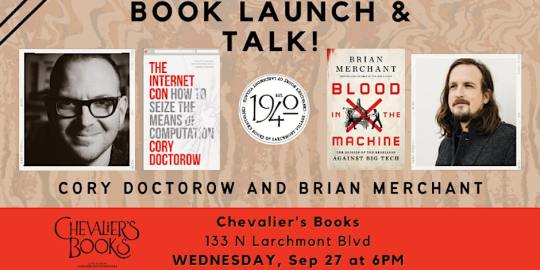

If you'd like an essay-formatted version of this post to read or share, here's a link to it on pluralistic.net, my surveillance-free, ad-free, tracker-free blog:
https://pluralistic.net/2023/09/15/fairy-use-tales/#sampling-license

Image: Tom Mrazek (modified) https://commons.wikimedia.org/wiki/File:An_Open_Field_%2827220830251%29.jpg
CC BY 2.0 https://creativecommons.org/licenses/by/2.0/deed.en
--
Penguin Random House (modified) https://www.penguinrandomhouse.com/books/707161/fables-20th-anniversary-box-set-by-bill-willingham/
Fair use https://www.eff.org/issues/intellectual-property
#pluralistic#fables#comics#graphic novels#dc#warner#monopoly#publishing#chokepoint capitalism#poison pills#ip#bill willingham#public domain#copyright#copyfight#creative commons#licenses#copyleft trolls
242 notes
·
View notes
Text



Hysteria is finally finished and available on itch.io!!
#myart#digital art#creepycute#visual novel#rpg maker mv#indie game#deer fables#hysteria game#original character#itch.io
10 notes
·
View notes
Text

— Self-Portrait as Allegory of Painting by Elisabetta Sirani, 1658 (detail)
The goal of art is one’s self-giving, And not the racket of success. To be a fable with no meaning Retold by all is shamefulness.
— Boris Pasternak, 1956 (translated by Andrey Kneller)
#context for the poem extract:#it's about the censorship of art which was considered “against what country needs”#during that period some paintings by Soviet artists were literally destroyed by a tractor#and Pasternak himself had to give up the Noble Prize for his novel Doctor Zhivago for this reason too#just in case someone misinterprets the meaning#art is a piece of your soul and you can create whatever you like and it won't be “a fable with no meaning” at all#as long as you enjoy what you're doing! <3#by artved#Russian poetry: Boris Pasternak#Russian poetry: 20th century#Italian art: Elisabetta Sirani#Italian art: 17th century#Painting: Self-Portrait as Allegory of Painting#art#painting#Italian art#poem#poetry#russian poetry#russian literature
10 notes
·
View notes
Text
So I’m playing Tavern Talk. I love it. But tell me why I fell for Fable and The Wind Echo(They change his name every time we see them😭). I was hoping I could at least tell Fable that they were cute😭😭😭. But I realized that I can only sit back and watch as others find love. I’ll just make drinks and be there for them😌
19 notes
·
View notes
Text

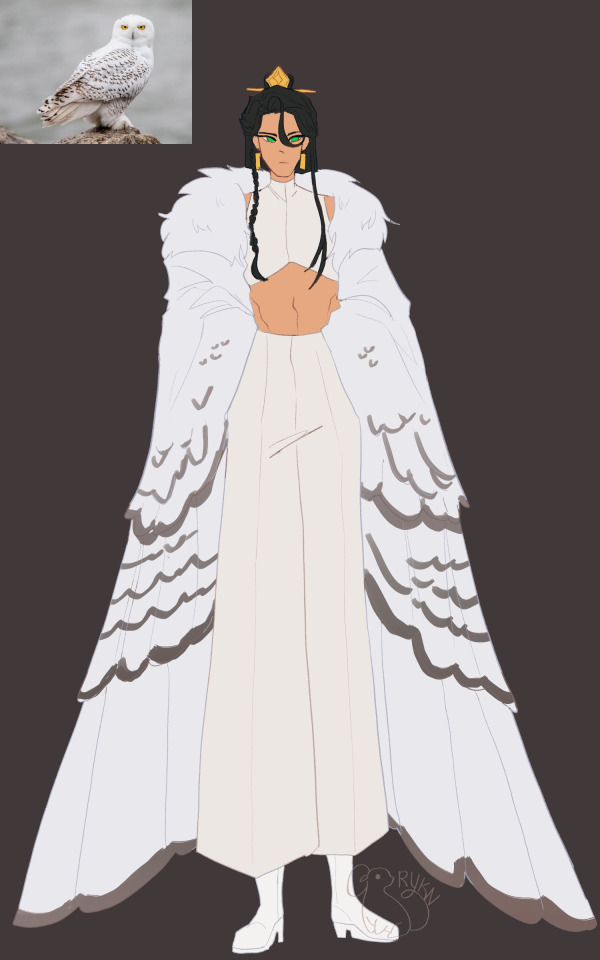
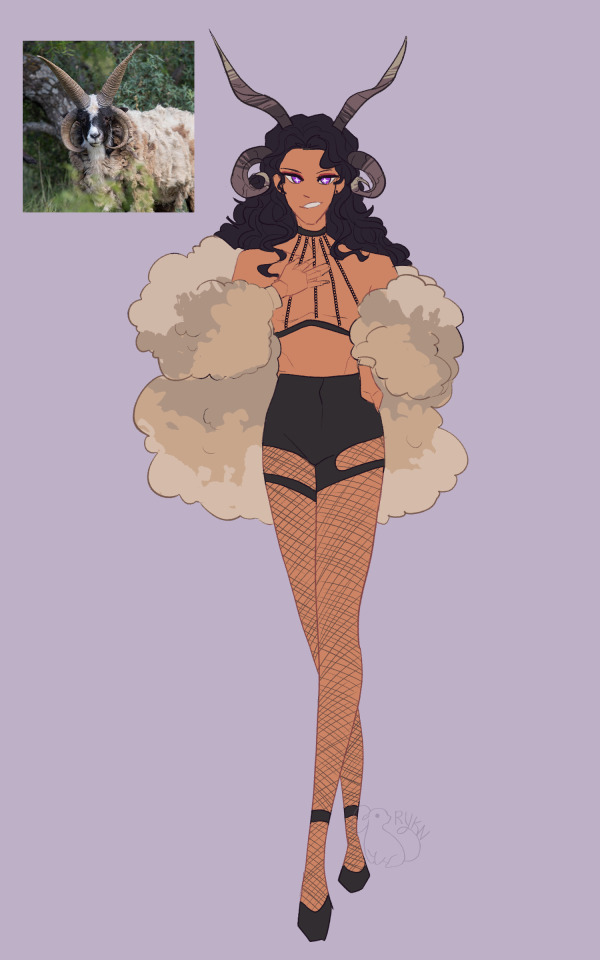
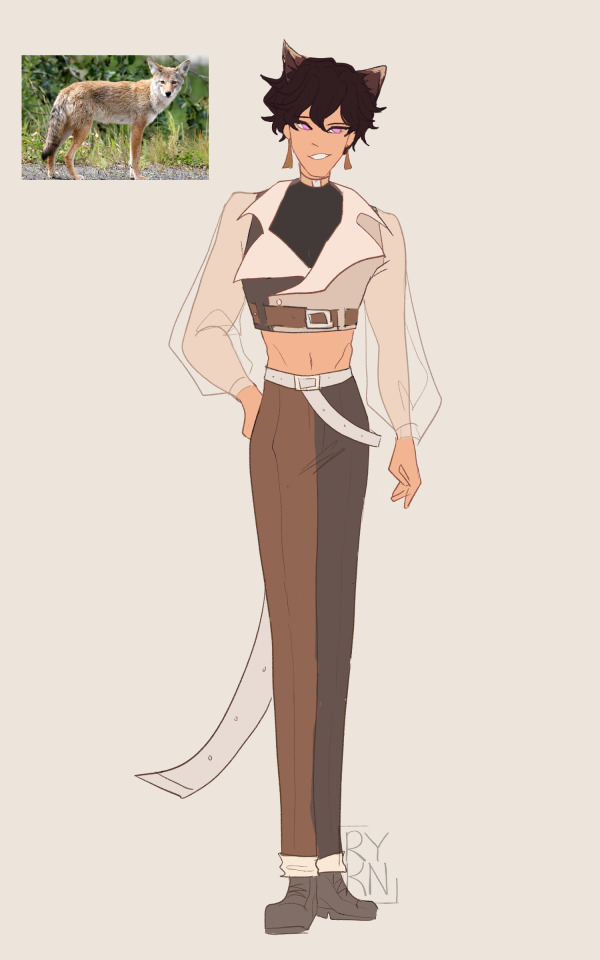

The theme for rev this year is... animals!
#remy#fable#novel#dov#waii#halloween#doodles#oc#original character#original art#oc artwork#artwork#digital art#character art#character design#long post#crow#snowy owl#hummingbird#coyote#sheep
66 notes
·
View notes
Text


.𖥔 ݁ ˖ ✦ ‧₊˚ ⋅ Hello!
Hi there, I wasn’t sure what to do for my first post so I thought I’d make a quick get to know me! .𖥔 ݁ ˖ ✦ ‧₊˚
𖥔 Muna, 20, she/he, WLW, Aquarius, INTP
𖥔 What’s this blog? I’m prone to procrastination, but I have so many projects and ideas I’ve been avoiding for a few years. I’d like to write games, write and illustrate my own comics, make better campaigns for my D&D party, and write some short stories/novels!
𖥔 Hobbies/Interests? Recently I’ve been really into BG3, but I like playing Skyrim, Resident Evil, and SoulsBorne games too! I’m currently replaying Fable, it’s very nostalgic for me. I like to read, my favorite author is Dostoevsky. I’m currently trying to read more fantasy rather than philosophy, as that’s that I’d like to write!

𖥔 Favorite animal? I love cats! I have 2 black cats. But I love squid, jellyfish and bears too!
𖥔 Favorite music? Some of my favorite bands are The Cure, Radiohead, and recently I’ve been listening to a lot of Daft Punk, Björk, and gulu gulu!
𖥔 Favorite movies? My favorite movies are both Bladerunner movies, Interstellar, Pan’s Labyrinth, Stalker, Coraline, and LOTR!

𖥔 Favorite books? Brothers Karamazov, The Vampire of Cuttleburn, and as of recently, The Poppy War! I just started Vinland Saga as well, and I like it a lot so far!
𖥔 Favorite comics? Paper Girls, Ultra Mega, Attack on Titan, and Bungo Stray Dogs. My favorite webcomic on webtoon right now is Nevermore and Deep Sea!
.𖥔 ݁ ˖ ✦ ‧₊˚ ⋅
𖥔 Feel free to say hi, I’m looking for a community to post some of my work to get feedback and get over my fear of sharing my writing! I’d also love to see your stuff as well! And thanks so much for reading! 🪼💙
𖥔 All images except jellyfish gif from Pinterest, links to post in alt text!
#get to know me#first post#first blog#writing#fantasy novel#rpg#indie games#pans labyrinth#dark souls#elden ring#baldurs gate 3#shadowheart#Skyrim#fable#bloodborne#sekiro#dostoevksy#poppy war#manga#vinland saga#PNW#writer#illustrator#comics#webcomic#say hi or something#reading#paper girls#ultra mega#munasnook
11 notes
·
View notes
Text
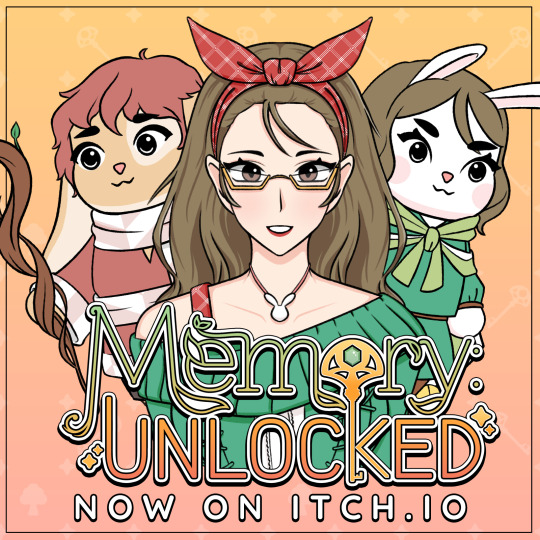
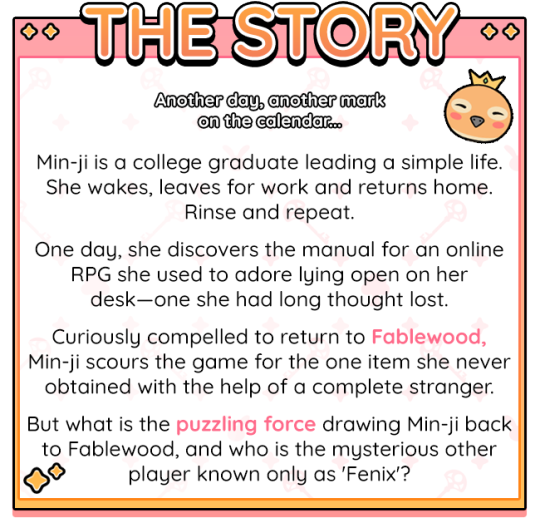
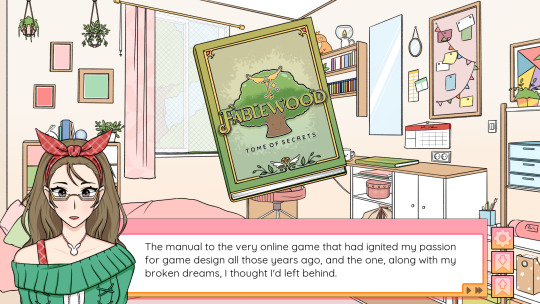
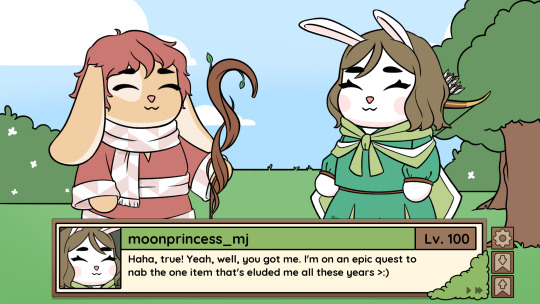
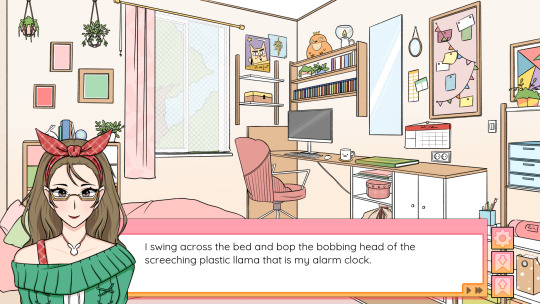
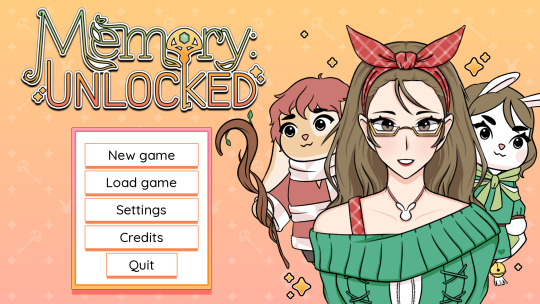
Our newest visual novel, Memory: UNLOCKED, is now available on Itch.io! 🗝️
In this game, not everything is as it seems...
Memory: UNLOCKED is a short otome visual novel with one key choice and a tragic mystery at its heart.
It's free to play and was made as part of Velox Fabula 2023, a ranked jam about crafting a complete visual novel in 10 days, based on a community-determined theme.
Moreover, once voting for the jam has concluded, we intend to bring an updated version to Itch.io, with full voice acting, more art, more music and a whole lotta polish~ 😊
Play it here and leave us a comment if you liked it—we would love to hear from you 😊As always, shares on Tumblr are *hugely* appreciated.
Lots of love,
The Fable & Clover Team 🍀
*** Want to support our projects? Now you can!☕
65 notes
·
View notes
Text
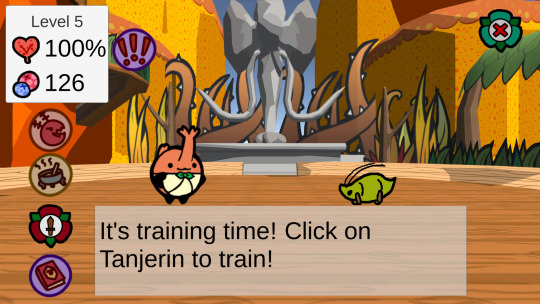
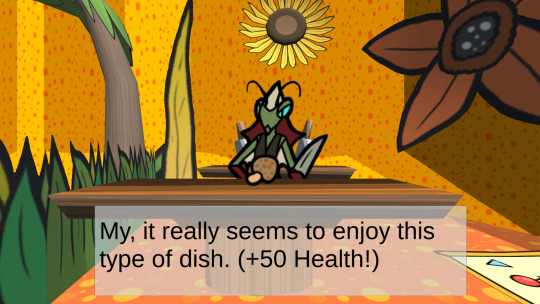
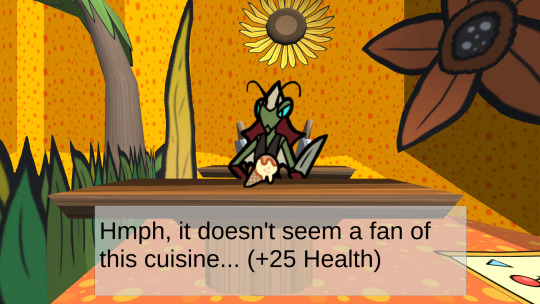
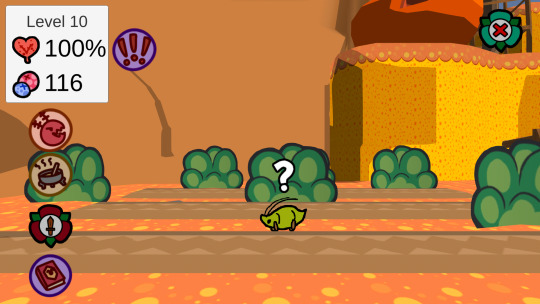
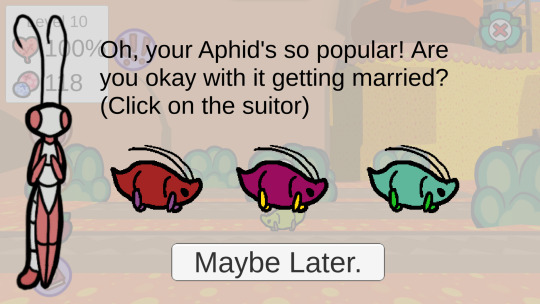
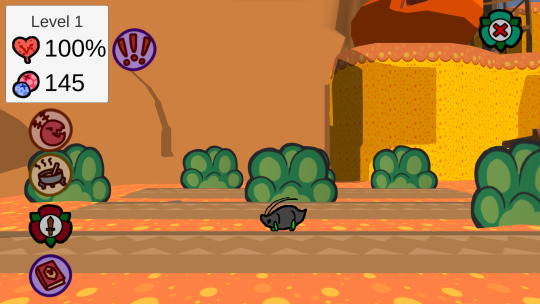
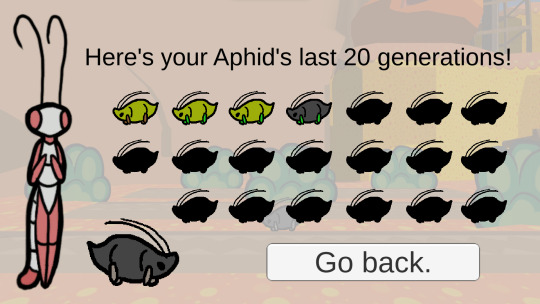
Fucked around the wiki and found out about the April Fools games.
Aphid Festival is a very basic pet raising simulator that is something like those you play when flash games were still around. It's fun and amusing for about 10 minutes, click your aphid for berries, level it up to level 10 and then raise their children.
Learned that there was a fighting game at some point but got cancelled for how much of a big project it was and it was during the Covid era. I would've like to play it though from that concept alone.
There's a visual novel but I don't feel like playing that at the moment, maybe later.
All of the games can be downloaded from Moonsprout's itch.io page.
Oh and here's Vi simulator:
#2000 likes and I'll do an Aphid Festival speedrun#This all happened because I wanted to check if human Mothiva was holding a gun#aside from ace attorney. I'm not a visual novel fan either or at least the traditional ones#bug fables#video#vio.txt
22 notes
·
View notes
Text
Does anyone else think the Eastern Kingdom is based off of Germany going by how it is described in The Balverine Order?
Also Reaver knows German as well which if you think about could be the language the Easterners speak.
1 note
·
View note
Text

Why Storytellers Have Been Using Labyrinths For Thousands Of Years - John Bucher
Watch the video interview on Youtube here.
#writing#magical#history#labryrinth#fable#myths#myths and legends#mythology#writers on tumblr#screenwriting#story#historical story#writes#author life#fantasy writer#writing community#writing fiction#writing fantasy#how to write#writing advice#how to write a story#how to write a screenplay#novel writing#authors of tumblr#writeblr#fiction writing#writerscommunity#creative writing
12 notes
·
View notes
Text
I knew what he meant because I’d seen it. Everyone had. Isolde was the wind and sea and sky of Saint’s world. She was the pattern of stars that he navigated by, the sum of all directions on his compass. And he was lost without her.
- Fable, Ch. 41, p. 234-235.
#quotes#fiction#novel#book#book snippet#fable#adrienne young#bookblr#books and literature#books and reading#reading list#saint x isolde
16 notes
·
View notes
Text




Deer Fables: Beginnings & The Less You Know The Better
Two visual novel styled games I made last year and that are up on itch.io! Free to play ~
#if you remember deer fables og name then yep!! I changed it recently!#both these games have pretty old art that I'd love to eventually re-do#but for now i think the art has it's own charm still#rpgmaker#visual novel#itchio#rpg maker#indie dev#my art#originalcharacters#Deer Fables
7 notes
·
View notes
Text
[from the introduction of a collection of short stories in french alongside their english translation]
The main emphasis of my brief was to produce a collection of short stories that had been published after 1970, and very early in the course of my researches it became clear to me that the country that is the birthplace of the language is no longer the main source of the genre.
oh cool! so you're going to be including african and caribbean authors? maybe some from asia?
The stories in this collection were all written by authors from Quebec or France
excuse me
I would have liked to include some of the Creole literature from the Caribbean but the tradition of story-telling there remains principally an oral one, with a strong emphasis on moral tales, often using animals as characters, very much in the style of Aesop or La Fontaine. The simplicity of the language means that they can be read easily by anyone with a basic knowledge of French, and the themes with which they deal are so markedly different from those of the stories I have chosen that it seemed inappropriate to include them. The same may be said for Francophone African literature, which also reflects a mainly oral tradition.
oh okay. go fuck yourself.
#why even say that france is no longer the main source of the genre if most of the stories you chose are from france?????#and canada. oh okay. whoop de frickin doo#and that shit about creole and african literature is such a copout#first of all i am sure there are african/creole authors writing short stories in a literary tradition that would be more familiar to you#i have read several novels by african authors in french. but apparently there exist NO short stories? okay.#and secondly even if that were true about the preponderance of fables that sounds incredibly interesting and worth exploring??#oh but no the language is too 'simplistic'? that is so stupid.#'the themes with which they deal are so markedly different that it seemed inappropriate to include them' GO FUCK YOURSELFFFF#french#my posts
4 notes
·
View notes
Text
The girl and the black wolf stood wondering on the mountaintop, feeling the chill air on their faces, seemingly lost in a dream, as they gazed into the immensity of the heavens. How could it be that wolf and man shared the same story? Or were they just in a story themselves, lost in a fable, as they hunted through the world for meaning?
David Clement-Davies, Fell
#David Clement Davies#Fell#wolf#animal quotes#animals#mountains#fable#story#YA novel#American literature#quotes#quotes blog#literary quotes#literature quotes#literature#book quotes#books#words#text
4 notes
·
View notes